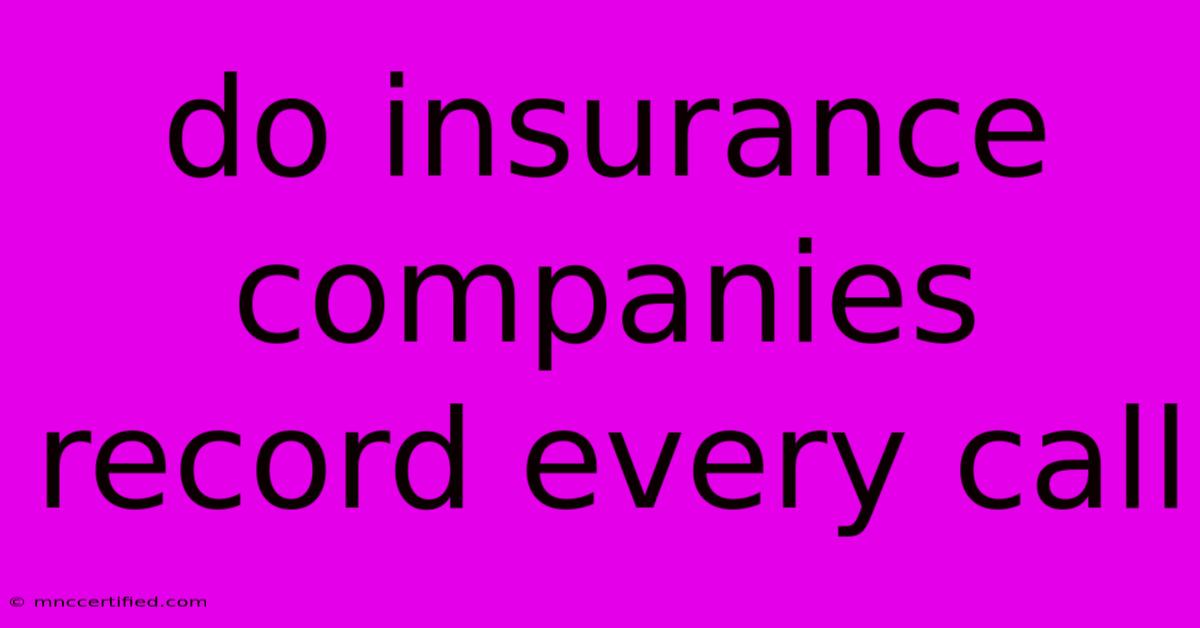Do Insurance Companies Record Every Call

Table of Contents
Do Insurance Companies Record Every Call? The Truth About Call Recording
In today's digital age, privacy concerns are paramount. With data being collected in numerous ways, it's only natural to wonder about the extent to which our conversations are being recorded, especially when it comes to sensitive topics like insurance.
So, the question arises: Do insurance companies record every call? The short answer is not necessarily. While some insurance companies do record all calls, others only record specific types of calls, and some don't record any calls at all.
Let's delve deeper into the nuances of this question, exploring the reasons behind call recording, the types of calls recorded, and what you can do to protect your privacy.
Why Do Insurance Companies Record Calls?
Insurance companies have several reasons for recording calls:
- Quality Control: Recording calls allows companies to monitor customer service representatives and ensure they are providing accurate information and maintaining a professional demeanor.
- Training and Development: Call recordings can be used as a tool for training new representatives and improving the overall customer service experience.
- Compliance and Legal Protection: In case of disputes or legal actions, call recordings can serve as evidence of conversations and agreements made.
- Fraud Prevention: Recording calls can help identify and prevent fraudulent activity, such as attempts to claim benefits for nonexistent events.
- Policy Updates: Recordings can document important updates or changes communicated to policyholders.
Types of Calls Often Recorded
Not all calls are recorded. Insurance companies typically record calls that fall into specific categories:
- Claims Calls: Calls related to reporting a claim are often recorded to document the details of the incident and ensure accurate processing of the claim.
- Sales Calls: Calls involving the sale of insurance policies are frequently recorded to ensure transparency and prevent potential disputes over policy terms.
- Customer Service Calls: Calls related to policy inquiries, billing issues, or general customer service are often recorded to ensure consistency and accuracy in providing information.
- High-Risk Calls: Calls involving complex situations, potential fraud, or sensitive information may be recorded for added security.
Your Right to Privacy and Notification
Although insurance companies have legitimate reasons for recording calls, it's crucial to understand your rights and how to protect your privacy:
- Notification: Insurance companies are generally required to notify you if they are recording your call. This notification is often given at the beginning of the call, usually through an automated message or a verbal announcement from the representative.
- Opt-Out Options: Some companies may allow you to opt out of call recording. It's best to inquire about this possibility during the call or check the company's privacy policy for more information.
- Data Security: Be aware that call recordings are sensitive data and should be handled securely by the insurance company. They have an obligation to protect your information from unauthorized access and use.
Tips for Protecting Your Privacy
- Pay Attention to Notifications: Be attentive at the beginning of calls and listen for any notification regarding call recording.
- Inquire About Recording Policy: If you're concerned about call recording, don't hesitate to ask the representative about the company's policy.
- Opt Out if Possible: If the company offers an opt-out option, consider exercising it if privacy is a major concern.
- Be Aware of Your Rights: Familiarize yourself with your state's privacy laws regarding call recording.
In conclusion, while some insurance companies record every call, many record only specific types of calls for legitimate reasons. It's essential to be aware of your rights, listen for notifications, and inquire about the company's recording policy to protect your privacy.

Thank you for visiting our website wich cover about Do Insurance Companies Record Every Call. We hope the information provided has been useful to you. Feel free to contact us if you have any questions or need further assistance. See you next time and dont miss to bookmark.
Featured Posts
-
Outer Banks Future Holds Spinoff Potential
Nov 08, 2024
-
Brightway Insurance Jacksonville Florida
Nov 08, 2024
-
Chelsea Vs Noah Confirmed Team Lineup
Nov 08, 2024
-
Cink Leads Schwab Cup Week In Phoenix
Nov 08, 2024
-
Lorry Driver Dies In M6 Crash Update
Nov 08, 2024